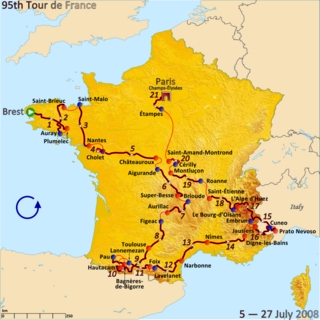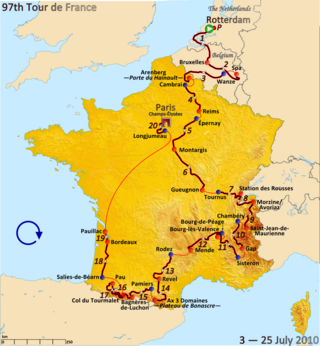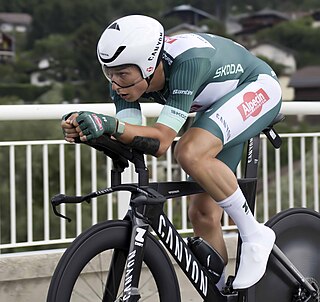
The 2002 Tour de France was a multiple-stage bicycle race held from 6 to 28 July, and the 89th edition of the Tour de France. The event started in Luxembourg and ended in Paris. The Tour circled France counter-clockwise, visiting the Pyrenees before the Alps. It has no overall winner—although American cyclist Lance Armstrong originally won the event, the United States Anti-Doping Agency announced in August 2012 that they had disqualified Armstrong from all his results since 1998, including his seven Tour de France wins from 1999 to 2005; the Union Cycliste Internationale confirmed the result.
The Vuelta a España is an annual multi-stage bicycle race primarily held in Spain, while also occasionally making passes through nearby countries. Inspired by the success of the Tour de France and the Giro d'Italia, the race was first organised in 1935. The race was prevented from being run by the Spanish Civil War and World War II in the early years of its existence; however, the race has been held annually since 1955. As the Vuelta gained prestige and popularity the race was lengthened and its reach began to extend all around the globe. Since 1979, the event has been staged and managed by Unipublic, until in 2014, when the Amaury Sport Organisation acquired control. Since then, they have been working together. The peloton expanded from a primarily Spanish participation to include riders from all over the world. The Vuelta is a UCI World Tour event, which means that the teams that compete in the race are mostly UCI WorldTeams, with the exception of the wild card teams that the organizers can invite.

The mountains classification is a secondary competition in the Tour de France, that started in 1933. It is given to the rider that gains the most points for reaching mountain summits first. The leader of the classification is named the King of the Mountains, and since 1975 wears the polka dot jersey, a white jersey with red polka dots.

The 2000 Tour de France was a multiple stage bicycle race held from 1 to 23 July, and the 87th edition of the Tour de France. There was no overall winner following a vacating of results by the United States Anti-Doping Agency announcement on 24 August 2012 that they had disqualified Lance Armstrong from all his results since 1 August 1998, including his seven Tour de France wins from 1999 to 2005; the Union Cycliste Internationale confirmed the result.

The Herald Sun Tour is an Australian professional bicycle race held in Melbourne and provincial Victoria, sanctioned by the Union Cycliste Internationale (UCI). The first tour was held in October 1952 as a six-day event. It is now held annually over five days in February. It is named after the Herald Sun, Melbourne's only daily tabloid newspaper. It was originally known as the Sun Tour after The Sun News-Pictorial, and changed its name when The Sun News-Pictorial merged with The Herald in 1990.

The 1996 Tour de France was the 83rd edition of the Tour de France, starting on 29 June and ending on 21 July, featuring 19 regular stages, 2 individual time trials, a prologue and a rest day. It was won by Danish rider Bjarne Riis.

The 1988 Tour de France was the 75th edition of the Tour de France, taking place from 4 to 24 July. It consisted of 22 stages over 3,286 km (2,042 mi). The race was won by Pedro Delgado with the top three positions at the end of the race being occupied by specialist climbers. This Tour was nearly 1,000 km shorter than the previous few editions, which were over 4,000 km, but by no means easier as it included five consecutive mountain stages including a mountain time trial.

The Tour de Pologne, officially abbreviated TdP, is an annual, professional men's multiple-stage bicycle race primarily held in Poland. It consists of seven or eight stages and is usually around 1,200 km in length. The race was first held in 1928 and is considered the oldest and most important bicycle race in Poland.

The 2007 Tour de France the 94th running of the race, took place from 7 to 29 July. The Tour began with a prologue in London, and ended with the traditional finish in Paris. Along the way, the route also passed through Belgium and Spain. It was won by Spanish rider Alberto Contador.

The 2008 Tour de France was the 95th running of the race. The event took place from 5 to 27 July. Starting in the French city of Brest, the tour entered Italy on the 15th stage and returned to France during the 16th, heading for Paris, its regular final destination, which was reached in the 21st stage. The race was won by Carlos Sastre.

Tour de Beauce is a men's elite professional road bicycle racing multi-day event held each June in the Beauce region of Quebec, Canada since 1986. It is the oldest stage-race in North America, and is a Union Cycliste Internationale (UCI)-rated 2.2 continental circuit stage race on the UCI America Tour.

The 2009 Tour de France was the 96th edition of the Tour de France, one of cycling's Grand Tours. It started on 4 July in the principality of Monaco with a 15 kilometres (9.3 mi) individual time trial which included a section of the Circuit de Monaco. The race visited six countries: Monaco, France, Spain, Andorra, Switzerland and Italy, and finished on 26 July on the Champs-Élysées in Paris.

The 2010 Tour de France was the 97th edition of the Tour de France cycle race, one of cycling's Grand Tours. It started on 3 July with an 8.9 km prologue time trial in Rotterdam, the first start in the Netherlands since 1996. The race visited three countries: the Netherlands, Belgium and France, and finished on 25 July on the Champs-Élysées in Paris.

The team classification is a prize given in the Tour de France to the best team in the race. It has been awarded since 1930, and the calculation has changed throughout the years. There is no colored jersey for this, but the numbers on the jerseys of the members of the team with the best performance in the general classification at the end of the previous stage are against a yellow background instead of white.

The points classification is a secondary competition in the Tour de France, which started in 1953. Points are given for high finishes in a stage and for winning intermediate sprints, and these are recorded in a points classification. It is considered a sprinters' competition. The leader is indicated by a green jersey, which has become a metonym for the points classification competition.
The 2013 Tour of Alberta is the inaugural edition of the Tour of Alberta stage race. The inaugural event is included on the UCI America Tour, with a UCI classification of 2.1. As such, the race was only open to teams on the UCI Pro Tour, UCI Professional Continental and UCI Continental circuits. The race takes place between September 3–8, 2013, as a six-day, six-stage race, traversing the province of Alberta. The race commences in Edmonton and finishes Calgary. The 2013 Tour of Alberta was one of seven UCI-ranked stage races in the North America in 2013.
The 2015 Tour Femenino de San Luis was the second edition of the Tour Femenino de San Luis, a stage race held in the San Luis province in Argentina. A 2.2-rated, UCI-sanctioned event, the race was held between 11 and 16 January. It was the first race of the 2015 Women's Elite cycling calendar and mirrored the men's cycling event, the Tour de San Luis. The race was won by Janildes Fernandes, riding for a Brazilian national team.
The 2018 VOO-Tour de Wallonie was a five-stage men's professional road cycling race, held in Belgium as a 2.HC race on the 2018 UCI Europe Tour. It was the forty-fifth running of the Tour de Wallonie, starting on 28 July in La Louvière and finishing on 1 August in Waremme.
The 2018 Tour de Suisse was a road cycling stage race that took place between 9 and 17 June 2018 in Switzerland. It was the 82nd edition of the Tour de Suisse and the twenty-fourth event of the 2018 UCI World Tour. The race was won by Richie Porte of BMC Racing Team.

The 2018 Tour de Pologne was a road cycling stage race that took place between 4 and 10 August in Poland. It was the 75th edition of the Tour de Pologne and the twenty-eighth event of the 2018 UCI World Tour. The race was won by Michał Kwiatkowski riding for Team Sky.














